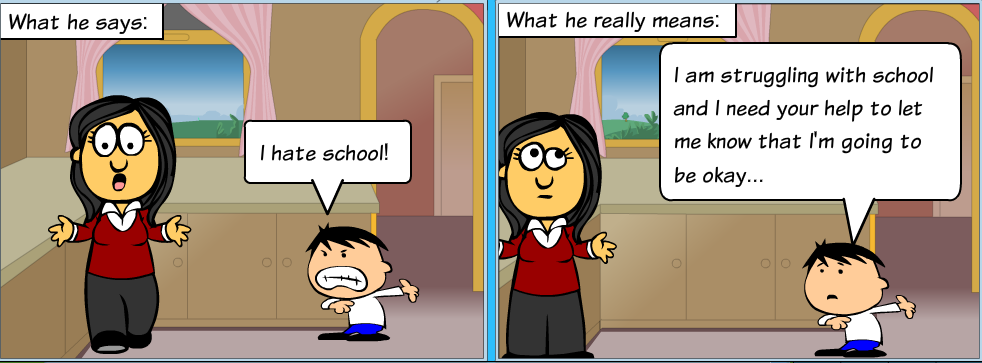Children who have learning disabilities may become discouraged about school because they carry a double burden – they must manage all the regular trials of childhood along with the strength and spirit needed to overcome their disability.
It is hard for us to watch our children struggle, and we often forget that struggling is not inherently bad, it can make a person stronger and more sensitive. Children who experience issues with learning can do well if they know they have support and understanding from their parents and teachers.
It is helpful in this situation to be empathetic with children. Daniel Goleman, the author of “Emotional Intelligence”, cites studies that have shown that children whose
parents empathize with them, are better able to manage their own difficult emotions, can soothe themselves and get angry less often. They are also more relaxed. These children have good social skills and are liked by their peers. Overall, they have fewer behavior problems, good attention skills and are more effective learners.

So how does empathy work? How can we give the reassurance, support, and empathy that these struggling learners so desperately crave?
Here are 3 ways that we can offer our children comfort and encouragement as they deal with their learning issues:
1. Understand what your child is telling you:
In order for empathy to work, we need to understand what our children are really telling us. When a child is struggling at school, they may complain using very unspecific, global terms:
“I hate school!”
“Homework is so stupid!”
“My teacher is the meanest teacher ever!”
“My friends always leave me out!”
In each of these cases, we want to avoid taking these complaints at face value. In essence, our children are telling us one thing:
“I am struggling with school and making friends and I need your help to let me know that I’m going to be okay.”
Once we understand their underlying message, we can now be empathetic and truly listen (see number 2, below) and name their feelings (see number 3, below).
2. Listen and acknowledge feelings with a word :
Whenever a child complains about anything we want to give them our full attention. It is helpful to turn to face your child and get down to his eye level. A gentle touch on the shoulder, leaning forward, smiling and nodding all indicate interest. This shows the child you care and his problem requires your full attention.
Some listening noises are often helpful. It helps the conversation along without adding to the drama and without being too intrusive.
“Oh?”
“Mmmm?”
“Really!”
“Wow!’” are just a few examples.
3. Empathize by giving children a name for their feelings:
When children complain it is important to reflect back their feelings. We can say:
“You sound so frustrated about school…”
“Homework feels overwhelming to you right now…”
“You are angry. You really wanted to do your project on the penguins, but you do not feel that your teacher understood how much you love and know about penguins.”
“Something happened on the playground to embarrass you…”
Parents may fear that by reflecting a child’s feelings they make things worse. The opposite is true. When we give our children’s feeling a name, it is the best way to show empathy and children feel comforted and calmer. They now have the words to describe their inner reality, which is often confusing to them.
We are also expanding their vocabulary of emotion words so that in the future they will be able to express their frustration and anger more easily. We are helping them develop emotional intelligence.
In our next article, we will talk about 3 more ways to use empathy to help our children overcome their struggles with school.
References:
http://www.ncld.org/students-disabilities/ld-education-teachers/tips-teachers-accommodating-students-dyslexia
Cline, F., Fay, J. (1990). Parenting with Love and Logic: Teaching Children Responsibility. CO: Pinon Press.
Faber, Adele and Elaine Mazlish. How To Talk So Kids Will Listen and Listen So Kids Will Talk, Avon Books, 1980
